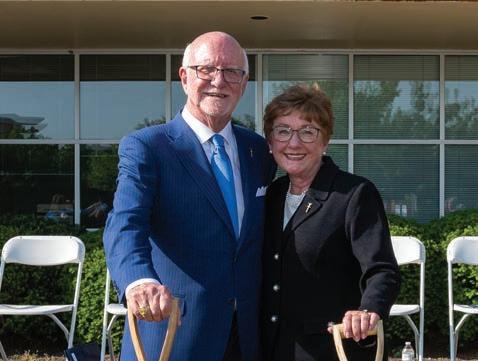
4 minute read
Alumni Feature
from Summer 2022
Alumnus Competes in World’s Longest Canoe and Kayak Race
When Pete Roscoe, DC (’00), CCSP and his wife Pilar Williamsen, DC (’00) read a 2010 National Geographic article about the annual Missouri River 340 (MR340), the longest nonstop canoe and kayak race in the world, they had only paddled a handful of times during vacations.
“At first, we thought the people who did it were crazy,” said Dr. Roscoe, who is an instructor for Logan’s Doctor of Chiropractic program and owner of Active Care Chiropractic in Chesterfield, Missouri. “But we couldn’t get it out of our minds. Eventually we decided it would be an adventure and signed up for the 2015 race.”
To prepare for the grueling 340-mile paddle from Kansas City to St. Charles, Missouri, they bought a 14-foot plastic tandem boat from REI, started training at Creve Coeur Lake in St. Louis, mapped out where they would eat and sleep along the route, and attended the mandatory safety meeting. Their goal was simply to finish.
The duo ended up crossing the finish line in 77 hours. Out of the 550 people who typically enter each year, only twothirds complete the course within the 86-hour time limit. Despite the difficulty of the race, Dr. Roscoe knew he wanted to compete again the moment his boat skidded to the shore.
He has now finished seven MR340 races—including the 2022 event held July 12-15—with Pilar acting as his “ground crew,” ensuring he has plenty of food, fluids and a place to sleep when he stops. Thanks to Pilar’s support, a new kayak named “The Tragically Hip” and a rigorous training regimen consisting of paddling as well as biking, soccer and P90X, Dr. Roscoe has managed to shave his finish time down to 61 hours and 29 minutes.
Dr. Pete Roscoe
Dr. Roscoe received prerace chiropractic care from Logan University student interns at the Montgomery Health Center.


Dr. Roscoe passing the Missouri State Capitol
“My goal is always to beat my personal best because there are so many factors both in and out of your control that can keep you from making good time or even finishing the race,” Dr. Roscoe said.
Temperatures in July can climb to more than 100 degrees, which can lead to health problems like heat stroke and heat exhaustion. People have also dropped out due to hypothermia resulting from not eating enough and wearing wet clothes for extended periods of time. A lack of sleep can cause some people to hallucinate—Dr. Roscoe once met a racer who said she saw a circus tent in the middle of the water. Additionally, turbulence from river traffic such as motorboats and commercial barges can capsize kayaks and canoes. Asian carp weighing up to 45 pounds have been known to injure boaters when they jump out of the water. For Dr. Roscoe, however, one of the biggest challenges can be maintaining a positive mental attitude during the race.
“It can be demoralizing when you’re only halfway through and start getting messages that the first boat already crossed the finish line,” Dr. Roscoe said. “Every year, I reach a point during the race when I tell my wife, ‘This is my last time,’ or ‘I’m going to sell my boat.’ But I always get back in the water, pick up the pace and remind myself how lucky I am just to be here competing.”
To stay motivated, he also thinks about racers he has met who have persevered through seemingly insurmountable challenges.
“One year we met a 40-year-old racing in a tandem boat with his 75-year-old father,” Dr. Roscoe said. “The son ended up dropping out, but his father went ahead and paddled the boat the rest of the way by himself. Another time, there was a woman who paddled a tandem more than 200 miles because her friend had quit. She ended up putting sandbags in his seat to distribute the weight.”
Injuries can keep people from completing the course, too. In 2021, Dr. Roscoe strained his left bicep shortly after passing the 50-mile mark. Although it was painful, he finished the race by paddling with only his right arm. To help prevent himself from getting hurt during the 2022 event, he received regular prerace chiropractic care from Logan University student interns at the Montgomery Health Center.
“They gave me adjustments and exercises to do at home that helped improve my kayaking form by increasing my thoracic and lumbar ranges of motion,” Dr. Roscoe said.
Although every MR340 tests his strength both mentally and physically, the supportive environment and camaraderie among participants inspires him to sign up every year.
“A few years ago, a racer stopped for a long period of time to help rescue another paddler who was in trouble,” Dr. Roscoe said. “He didn’t think anyone would be waiting for him at the end since it was dark and just before the deadline, but all the people who had finished hours ago came to the shore just to cheer him on. He was so surprised and happy to see all of us that I almost cried. He’s just one of the many incredible people I’ve met at this race who has every excuse to quit but chooses to keep going.” Dr. Roscoe has finished seven MR340 races.











